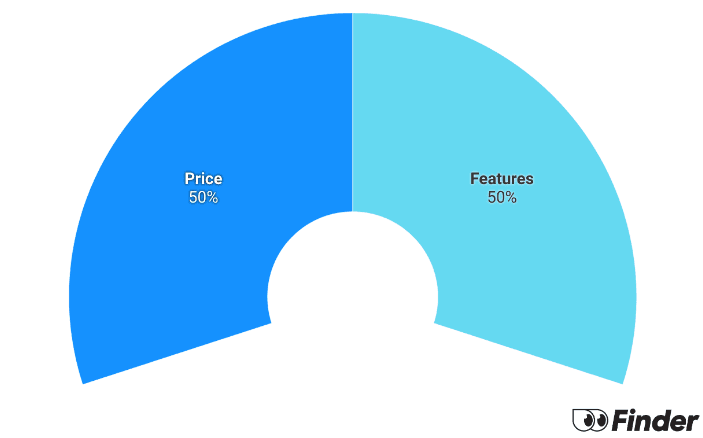Compare health insurance with physiotherapy
Finder Score - Health Insurance Extras
Each month we analyse over 10,000 extras insurance products and rate each one on price and features. What we end up with is a nice round number out of 10 that helps you compare extras cover a bit faster.
We want to compare apples to apples, not apples to apple pie. It doesn't make sense to compare a top extras policy with coverage for hearing aids and braces against a policy designed only for dental. So we've separated all the extras policies on the market into pools and categories. Once in their pools and categories, each product gets a price score and a features score, which are then combined to give the Final Score.
Key takeaways
- Physio is covered by most basic extras policies from around $3 per week.
- The physiotherapy benefit will likely have a per item limit and an annual limit - you should consider both in your comparison.
- Waiting periods may apply.
- The cost of physiotherapy without insurance can be around $80 to $130+ for a standard consultation.
How much is physiotherapy without insurance?
Physiotherapists will typically charge you per appointment, depending on the appointment type. Some treatments will require only a single appointment, but you'll generally need to visit a physio on multiple occasions for most issues. The table below lists some common appointment types and typical costs from Australian physios.
| Appointment type | Typical cost |
|---|---|
| Initial consultation | $50-$200 |
| Standard appointment | $100-$125 |
What amount will I be able to claim back?
Depending on the health fund and extras policy you choose, your benefit amount for physio services may be calculated in the following ways.
- Set benefit. This means that your rebate will take the form of a fixed dollar amount for claims on eligible services, such as $40 or $50.
- Percentage benefit. Alternatively, your rebate may be calculated as a percentage of the total fee charged for the service, for example 50% or 75%.
It is also worth remembering that an annual limit will apply to the maximum rebate you are able to claim per person. Luckily, your extras benefits reset each year.
What physiotherapy expenses are covered?
Health funds cover physio on extras policies, although the benefit amounts provided will depend on the level of cover you choose. For example, a basic extras policy may only provide limited benefits or even exclude physio altogether. However, if included an extras policy will generally cover the physio-related services listed below.
- Initial and follow-up consultations.
- The development of a treatment plan.
- Pilates or hydrotherapy.
- Antenatal exercise classes.
- Compression recovery items.
- Rehabilitation.
Be aware that there are certain physio-related items that are not commonly covered by private health funds. These can include foam rollers, trigger balls and sports tape. Also keep in mind that services and items that can be claimed may differ between health funds and individual extras cover, so make sure to compare the features of each policy closely before making a purchase.
Does Medicare cover any physiotherapy services?
For most out-of-hospital physiotherapy, Medicare does not provide cover, so you'll need to cover the cost either out-of-pocket or with private health insurance. However, there are 2 situations where Medicare can provide benefits for physio-related treatment - during public hospital admittance, and for chronic disease management:
- Public hospital admittance. Medicare provides some benefits for public hospital patients who need inpatient physio treatment or rehabilitation.
- Chronic Disease Management program (CDM). Medicare may also cover certain physio-related services if they are part of a CDM recommended by at least two allied health professionals and a GP. Eligible chronic diseases can include arthritis, diabetes, cancer, stroke and musculoskeletal conditions.
- Extras only: $44
- Basic: $105
- Bronze: $152
- Silver: $179
- Gold: $260
Frequently asked questions
Sources
More guides on Finder
-
Are vaccinations covered by health insurance?
While COVID-19 vaccinations are free in Australia, other vaccines with out-of-pocket costs can be covered by private health insurance with some extras policies.
-
Health insurance for chiropractic treatment
Get discounts on your chiropractic treatment with private extras cover.
-
Health insurance for remedial massage
Remedial massage can help ease pain from general wear and tear as well as specific injuries. This treatment isn’t covered by Medicare but is included in private health insurance extras cover. Find out how private health insurance can cover you for remedial massage therapy.
-
Health insurance for blood pressure monitors
Find out when blood pressure monitors will be covered by Health Insurance and what you stand to receive in a claim.
-
Travel vaccinations and health insurance
Before you travel it's crucial to protect your health from risks found in popular destinations. Learn how extras health insurance can help pay for them.
-
Optical health cover
Optical health cover can ensure you get the care you need to protect your eye health. Compare health insurance policies with optical cover.
-
Health insurance for non-PBS pharmaceuticals
If you're wondering what pharmaceutical costs are covered by private health insurance, we've got a guide to health cover for non-PBS pharmaceuticals here.
-
Health insurance for laser eye surgery
finder.com.au explains how the private and public health system in Australia handles optical procedures and services.
-
Health insurance with gym benefits
This guide takes a look at private health insurance in relation to gym membership and other health-related services.


